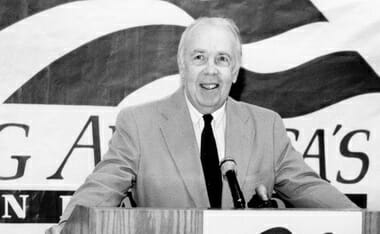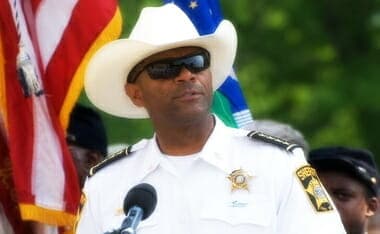Via NEWSBUSTERS:
…On September 11, 1972, Cronkite cited scientists’ predictions that there was a “new ice age” coming. He called that prediction from British scientist Hubert Lamb “a bit of bad news.”
Cronkite continued. “That while the weather may be just a little colder in the immediate years to come, the full extent of the new ice age won’t be reached for 10,000 years. And if you can stand any more good news, even then it won’t be as bad as the last ice age 60,000 years ago. Then New York, Cincinnati, St. Louis, were under 5,000 feet of ice. Presumably no traffic moved and school was let out for the day. And that’s the way it is, Monday, September 11, 1972.”
Lamb, the scientist Cronkite cited, was no fringe scientist. He founded the Climatic Research Unit at the University of East Anglia in Great Britain. When he died, the CRU director called him “the greatest climatologist of his time,” according to the Global Warming Policy Foundation. He was also credited with establishing “climate change as a serious research subject.”
Unlike scientists often quoted by the media today, GWPF said that Lamb viewed the Earth’s climate as changing constantly and naturally. Unlike its founder, CRU now has a major role in spreading global warming alarmism. CBS said in 2009, CRU “wields outsize influence” in warming circles. The Climategate scandal centered around leaked documents and emails from that organization….
Scaring the public in order to get funding is a multi-billion dollar industry, as is the push by leftists to “conquer” once and for all (since the days of Marx) “capitalism.” M.I.T.’s Richard Lindzen notes:
- Billions of dollars have been poured into studies supporting climate alarm, and trillions of dollars have been involved in overthrowing the energy economy. So it is unsurprising that great efforts have been made to ramp up hysteria, even as the case for climate alarm is disintegrating.
One should FOLLOW THE MONEY!
The following resignation letter was sent by Hal Lewis, professor emeritus of physics at the University of California, Santa Barbara, to the American Physical Society:
Sent: Friday, 08 October 2010 17:19 Hal Lewis
From: Hal Lewis, University of California, Santa Barbara
To: Curtis G. Callan, Jr., Princeton University, President of the American Physical Society
6 October 2010
Dear Curt:
When I first joined the American Physical Society sixty-seven years ago it was much smaller, much gentler, and as yet uncorrupted by the money flood (a threat against which Dwight Eisenhower warned a half-century ago).
Indeed, the choice of physics as a profession was then a guarantor of a life of poverty and abstinence—it was World War II that changed all that. The prospect of worldly gain drove few physicists. As recently as thirty-five years ago, when I chaired the first APS study of a contentious social/scientific issue, The Reactor Safety Study, though there were zealots aplenty on the outside there was no hint of inordinate pressure on us as physicists. We were therefore able to produce what I believe was and is an honest appraisal of the situation at that time. We were further enabled by the presence of an oversight committee consisting of Pief Panofsky, Vicki Weisskopf, and Hans Bethe, all towering physicists beyond reproach. I was proud of what we did in a charged atmosphere. In the end the oversight committee, in its report to the APS President, noted the complete independence in which we did the job, and predicted that the report would be attacked from both sides. What greater tribute could there be?
How different it is now. The giants no longer walk the earth, and the money flood has become the raison d’être of much physics research, the vital sustenance of much more, and it provides the support for untold numbers of professional jobs. For reasons that will soon become clear my former pride at being an APS Fellow all these years has been turned into shame, and I am forced, with no pleasure at all, to offer you my resignation from the Society….
(HEARTLAND | WATTS UP WITH THAT | CLIMATE REALIST | NEWSMAX)
Selected highlights from the above video via CLIMATE DEPOT:
Lindzen on VP Joe Biden saying ‘Denying climate change is like denying gravity.’
Lindzen: ‘He’s absolutely right. Climate has been changing for 4.5 billion years and on all time scales.
This is the problem. These guys think saying climate changes, saying it gets warmer or colder by a few tenths of a degree should be taken as evidence that the end of the world is coming. And it completely ignores the fact that until this hysteria, climate scientists used to refer to the warm periods in our history as optima.
Lindzen on CO2: ‘So here we are demonizing a chemical — a molecule essential to life – CO2– we are declaring doom based on things we used to like and somehow we are supposed to overturn our whole economy in order to deal with this purported disaster.’
Lindzen on EPA Chief: ‘Obviously I don’t think [the science] matters to [EPA Chief] McCarthy. She has a political aim. She has her marching orders and they are the orders regardless of what the underlying science is.’
Lindzen on what impact EPA regs will have on climate: ‘No matter what you believe about climate, none of them will have any impact on climate. They do make energy more expensive less available, less useful, they do hurt the poor, and they raise prices. It’s hard to see what the upside is excerpt for the people who get the subsidies. The whole thing is fairly absurd. There is so much money changing hands.’
ADDITION
BREITBART notes another interesting “evolving” positions towards evidence:
The American Physical Society (APS) has signalled a dramatic turnabout in its position on “climate change” by appointing three notorious climate skeptics to its panel on public affairs (POPA).
They are:
Professor Richard Lindzen, formerly Alfred P Sloan Professor of Meteorology at Massachussetts Institute of Technology (MIT), a highly regarded physicist who once described climate change alarmism on The Larry King Show as “mainly just like little kids locking themselves in darkclosets to see how much they can scare each other and themselves.”
John Christy, Professor of Atmospheric Science at the University of Alabama in Huntsville, who has written: “I’m sure the majority (but not all) of my IPCC colleagues cringe when Isay this, but I see neither the developing catastrophe nor the smokinggun proving that human activity is to blame for most of the warming wesee.”
Judith Curry, Chair of the School of Earth and Atmospheric Sciences at Georgia Tech, a former Warmist (and still a self-described “luke warmer”) who has infuriated many of her more extremist colleagues by defending skeptics and by testifying to the US House Subcommittee on the Environment that the uncertainties in forecasting climate science are much greater than the alarmists will admit.
As Anthony Watts has noted, this is news guaranteed to make a Warmist’s head explode.
The reason it’s so significant is that it comes only three years after one of the APS’s most distinguished members – Professor Hal Lewis – resigned in disgust at its endorsement of what he called “the global warming scam.”…..




